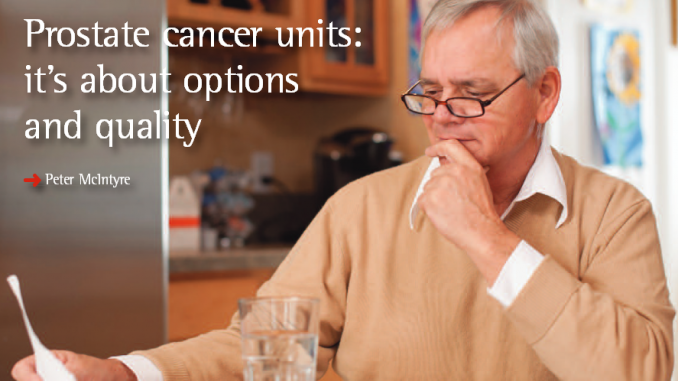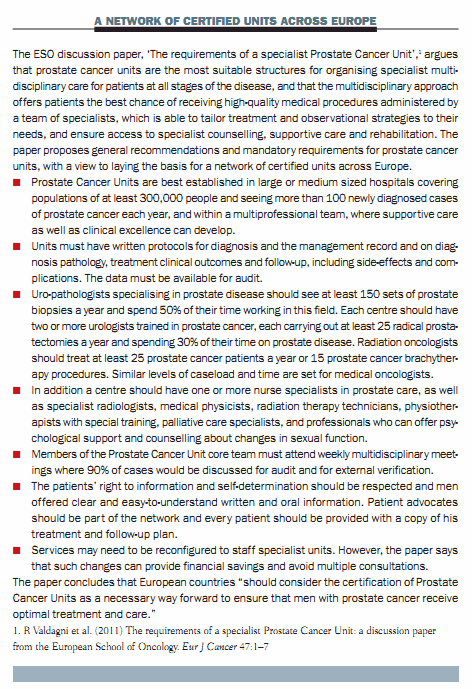
Men diagnosed with prostate cancer have a wealth of options on how to proceed, but they can pay a high price if the quality of treatment is substandard. Could delivering all prostate care through specialist multiprofessional units be the answer to safeguarding both standards and choice?
The most common cancer in men has seen a rapid increase in cases and treatments over the past two decades. About 382,000 men in Europe are diagnosed with prostate cancer each year, and there are 89,000 deaths. However, there has been a lack of clarity over the best way to match the right treatment to the right patient.
There are at least three treatments, each about as good as the other in skilled hands: surgery (radical prostatectomy), radiotherapy and brachytherapy, in some cases combined with hormonal therapy. After a rapid increase in the number of surgical cases in the 1990s and early years of this century there has been a pull back from aggressive treatment in early or indolent cancers.
The after-effects of treatment, particularly impotence or incontinence, scare a lot of men and there is increasing recognition that quality of life is of great concern, alongside a desire to be rid of the cancer.
Patients who are newly diagnosed with prostate cancer have choices to make. Do they opt for immediate treatment or for active surveillance? If they opt for treatment, which is best for them?
There is a third choice, of which patients may not be sufficiently aware, and that concerns the kind of centre where their treatment and care will take place. It is widely accepted that cancer is best treated in a multidisciplinary setting by specialists with expertise in the particular disease, backed by a multiprofessional team. While this is becoming the norm for breast cancer, it is not widely practised for prostate cancer.
Last year the European Journal of Cancer published a discussion paper from the European School of Oncology (ESO) promoting specialist prostate cancer units and setting out proposals for what that might mean in terms of professional staff and experience. The paper was reminiscent of proposals for breast cancer specialist centres published in the 1990s as part of a European movement to improve treatment and prevent overtreatment. It meant in effect that unless a surgeon or radiotherapist was going to specialise in this disease, they had no business dabbling in it.
The same thing may happen, eventually, for prostate cancer, but the movement is slow to gather momentum. The Deutsche Krebsgesellschaft (German Cancer Society) has taken the lead by setting up a network of certified prostate cancer units. The UK National Institute for Health and Clinical Excellence (NICE) has set minimum standards, under which, for example, specialist urology teams should undertake a minimum of 50 radical operations per year.
Speaking the same language
Riccardo Valdagni is director of the Prostate Cancer Programme at the Istituto Nazionale Tumori, in Milan, coordinator of ESO’s Prostate Cancer Programme and lead author of the ESO paper. He says that moving to a multidisciplinary approach is a challenge. “Urologists, radiation oncologists and medical oncologists have different approaches to the disease and speak different languages. The most ambitious – though necessary – step when the Prostate Cancer Programme was established was to share evidence-based as well as institution-adapted guidelines for the diagnosis, therapy, observation, and follow-up of prostate cancer patients.
“The general worldwide approach is that the patient has a biopsy, he receives a prostate cancer diagnosis from the urologist, and then the urologist generally makes the first proposal of therapy. We prefer to have a urologist, radiation oncologist and psychologist (with a medical oncologist on demand) meet with the patient, discuss the therapeutic and observational options, and offer support for decision making. International guidelines all over the world say we have three equally effective therapies, so we cannot decide, as doctors, which is the best.”
“We have three equally effective therapies, so we cannot decide, as doctors, which is best”
Patients are then encouraged to choose the treatment, weighting their values and priorities, says Valdagni. Is erectile dysfunction a major issue for them? What about urinary incontinence? “One patient may say, ‘yes, very important’. Another may say, ‘I don’t mind about side-effects, I want the cancer out of my body as soon as possible.’”
In Valdagni’s centre, few patients ask the clinician what he would do in their shoes. He thinks this is because they have enough time and information to make a decision, with psychological support if necessary.
“In general, the problem of saying ‘Hey doctor, what would you do?’ is related to the psychological effect of being diagnosed with cancer. Patients may prefer at first to have someone take the decision for them. Offering exhaustive information on all his options and supporting him psychologically, we try to help the patient find his way. The patient, instead of being an object of physician care, can become the subject of his care, deciding what is best for his quality of life.” “Offering exhaustive information on all his options, we try to help the patient find his way”
At the Milan Prostate Cancer Programme, most patients with small or clinically indolent disease choose active surveillance. Of those who drop out from active surveillance and have treatment, about 45% choose surgery, 50% radiotherapy and 5% brachytherapy.
The pattern in monospecialist centres is quite different, and it seems that unless they work together, specialists, perhaps unconsciously, influence patients in favour of their speciality. One paper suggests that, if the patient sees only a urologist, 70–80% opt for surgery. If they also see a radiation oncologist, 70% choose radiation.
Louis Denis speaks as a founding member of the European prostate cancer patient group Europa Uomo, which advocates for patient-centred care where quality of life is as important as survival. He is also the director of the Antwerp Oncology Centre, and says that, while multidisciplinary care is widely accepted in theory and is a legal requirement in Belgium, it is not widely implemented. “We still face the dilemma between the traditional freedom of treatment choice for the individual specialist and the better outcomes of cancer treatment by multidisciplinary management.
“There is known overtreatment for patients with prostate cancer for a number of reasons. Among these we should recognise lack of correct evaluation of the patient’s health status, ignorance of the clinical course of low-risk, low-volume prostate cancer and the availability of advanced technology that cannot rest idle. The slogan of Europa Uomo remains: ‘First the Patient, then his Cancer’.”
Understanding the options
Lawrence Drudge-Coates, clinical nurse specialist in urological oncology at King’s College Hospital, in London, agrees. His is a specialist unit in all but name, with 260 new prostate cancer patients a year. As one of two key workers for patients, he runs his own clinics and encourages patients to take their time in making an informed decision.
“One of the key roles that the clinical nurse specialist plays is to take patients through the pros and cons in more detail in laymen’s terms. I explain what we have found from the biopsies and scans and whether it is an aggressive tumour. I go through the treatment options, but not in too much detail. If a patient is being given a diagnosis, their ability to take in information is very greatly reduced. You give a bit of information and supplement it with good literature, and I give the patient my contact details as key worker, and the opportunity to discuss issues further.
“Not all cancers have to be treated and I think this is still quite an alien concept for most patients. If active surveillance is an option I would explain why. It may be a cancer that is not particularly aggressive. In many cases we advise them to have further biopsies. There is a contract between myself and the patient.”
“Not all cancers have to be treated and I think this is still quite an alien concept for most patients”
Drudge-Coates takes time to talk about the major possible effects of treatment – erectile dysfunction and incontinence. “You have to be very upfront and state that these are key issues in relation to surgery and radiotherapy. I don’t call them a side-effect because it belittles them. However, many patients already have erectile dysfunction prior to treatment because of prostate cancer or other medical issues, which we always assess prior to treatment.
“You can treat erectile dysfunction, and what we do here is actually begin patients on PDE5 inhibitors such as Viagra after the urethral catheter has been removed following surgery. There is evidence to suggest that the earlier you introduce treatment, the more effective it is likely to be.”
The specialist nurse advises patients that incontinence should gradually improve over time if they undergo a course of pelvic floor exercises. “A small number of patients are never going to be completely continent, related to a number of issues, including the complexity of the surgery.”
Drudge-Coates advises patients to be upfront in questioning surgeons about incidence rates for incontinence and erectile dysfunction. “I openly tell patients these are things you have got to be aware of because these are life-changing events. In the UK we are seeing patients cherry-picking where they go for surgery based on the experience of the surgeon and based on the outcome, which makes perfect sense.
“We are seeing patients cherry-picking where they go for surgery based on the experience of the surgeon”
“I think this will evolve as cancer centres publish their results. In my experience patients are asking surgeons more direct questions about complication rates and incontinence. ‘How good are you as a surgeon?’ ‘How many of these procedures have you done?’”
Just as urologists and radiotherapy oncologists have to specialise in prostate cancer, so too do nurses. Drudge-Coates is on the board of the European Association of Urology Nurses, which is in the process of defining the core competencies of the specialist nurse and their training needs.
What outcomes should a centre achieve?
The ESO discussion paper published online in December 2010 did not attempt to specify what outcomes specialist prostate cancer centres should achieve, and may be criticised for advocating something without clear evidence of improved outcomes.
However, Valdagni is confident that the evidence will come. “We know that caseload is strongly related to the quality of radical prostatectomy and we also know that caseload in radiation therapy is related to less use of secondary treatment. That means that if the centre has a high caseload and works with a lot of prostate cancer patients, radiation will be better and results will be better and secondary treatment for failure will be less.”






